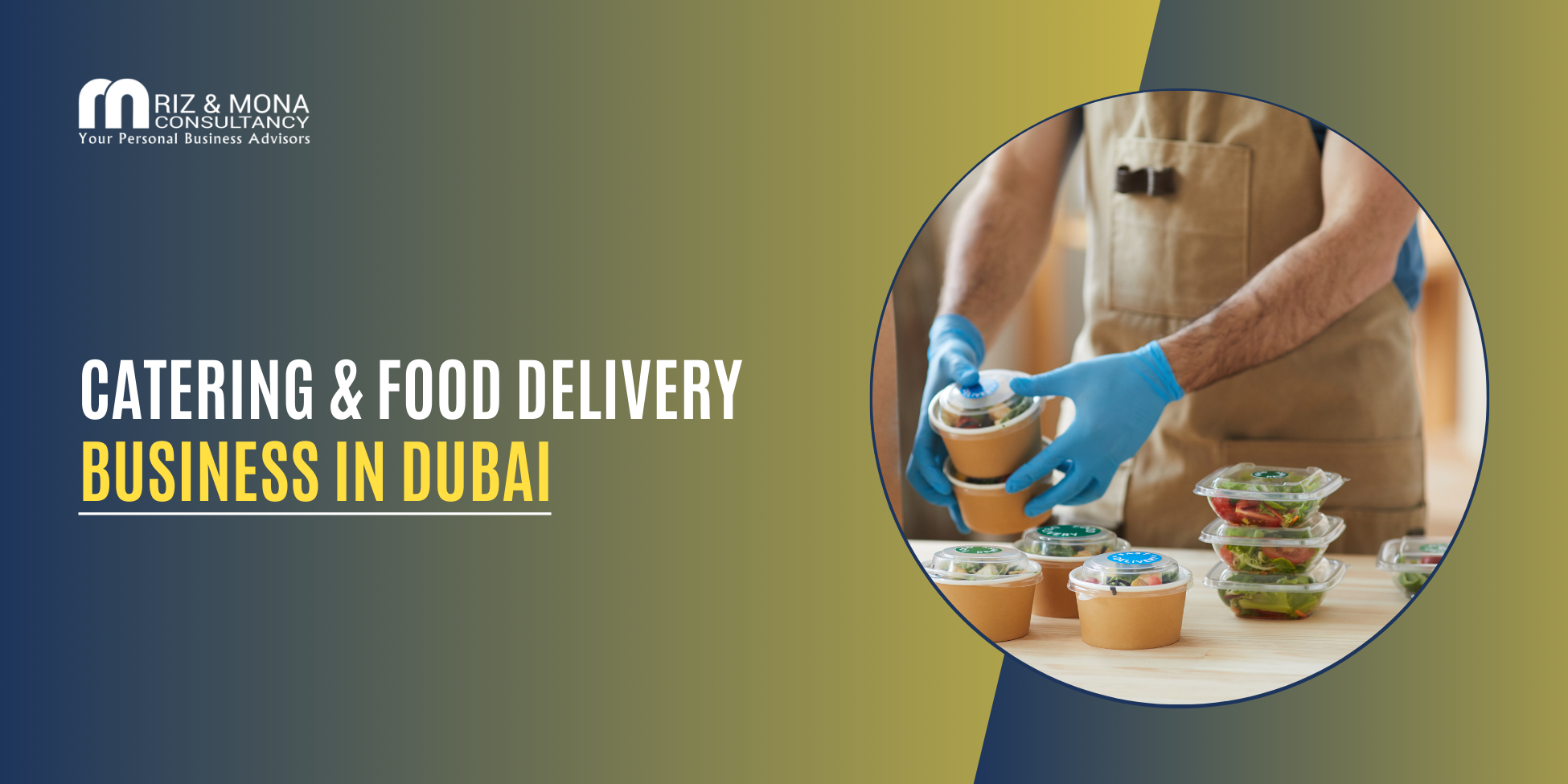Starting a catering business in Dubai, UAE, is a great opportunity. Dubai is known for its mix of cuisines, including famous dishes like Manousheh and Iranian Sangak. With many events like weddings and corporate gatherings, there is a high demand for catering services.
The food market in Dubai is growing fast, with a 17.10% growth rate expected from 2024 to 2029. The city’s economy is strong, and people have more disposable income, making it an ideal time to start your catering business and meet the growing demand.
How to Set Up a Catering Business in Dubai?
Starting a business of catering and food delivery in Dubai, UAE begins with understanding the overall business setup process. This involves choosing the type of business entity, registering the business with the relevant authorities, and obtaining the necessary licenses and permits. The process of business setup in Dubai requires attention to detail to ensure compliance with all regulatory requirements.
- Choosing the Right Business Entity for Company Formation: Decide your company name and whether to establish a sole proprietorship, limited liability company (LLC), or another type of entity. Each type has its own legal and financial implications.
- Registering Your Business: Register your company and business name in Dubai with the Dubai Department of Economic Development (DED) or the relevant free zone authority. This involves submitting necessary documentation and meeting specific criteria.
- Compliance with Local Regulations: Ensure your business complies with UAE regulations, including health and safety standards, labor laws, and business practices.
Key Steps to Take Before Starting a Catering Business in Dubai
Thorough market research and strategic planning are crucial for success in the catering business.
- Identifying Target Audience: Determine who your primary customers will be. Are you catering to corporate events, private parties, or general consumers? Understanding your target audience helps tailor your services and marketing strategies.
- Analyzing Competitors: Study your competitors to understand their strengths and weaknesses. Identify gaps in the market that your business can fill.
- Crafting a Unique Selling Proposition (USP): Develop a unique selling proposition that differentiates your business from competitors. This could be a signature dish, exceptional customer service, or innovative delivery methods.
Step-by-Step Guide to Opening a Catering Business in Dubai
Conduct Market Research and Planning
Thorough market research and strategic planning are crucial for success in the catering business.
- Identifying Target Audience: Determine who your primary customers will be. Are you catering to corporate events, private parties, or general consumers? Understanding your target audience helps tailor your services and marketing strategies.
- Analyzing Competitors: Study your competitors to understand their strengths and weaknesses. Identify gaps in the market that your business can fill.
- Crafting a Unique Selling Proposition (USP): Develop a unique selling proposition that differentiates your business from competitors. This could be a signature dish, exceptional customer service, or innovative delivery methods.
Obtain a Catering Business License
Obtaining the appropriate licenses and permits is essential for starting your catering business legally in Dubai.
- Catering Business License: After applying for your trade license, you can apply to the Dubai Food Safety Department for your catering license. Apply for a catering license in Dubai from the DED or the relevant free zone authority. This involves submitting a detailed business plan, including floor plans, equipment details, and food safety measures to Dubai Municipality.
- Food Delivery License Requirements: If you plan to offer food delivery services, you will need a separate food delivery license.
- Catering License Requirements:
- Registration on FoodWatch: Catering businesses in Dubai must be registered on the FoodWatch platform.
- Compliance with Dubai Food Code: Ensure your business meets all food safety standards and regulations.
Ensure Compliance with Dubai Food Code and Safety Regulations
Compliance with the Dubai Food Code is crucial for maintaining high standards of food safety and protecting public health.
- Purpose and Scope: The Dubai Food Code ensures high standards of food safety and applies to all catering companies in Dubai and food establishments(food truck business, dine-in cafés, and restaurant busineses) and other business activities, including free zones and private development zones.
- Foodborne Illness Control: Targets vulnerable groups like children, pregnant women, the elderly, and immunocompromised individuals. Effective control is crucial to avoid adverse health effects and protect the UAE’s food industry.
- Model Requirements: Provides guidelines for food establishments to achieve compliance with food regulations and aims for consistency in interpreting and applying food safety regulations among all stakeholders.
- Consumer Protection: Safeguards against fraudulent practices, adulteration, and actions causing illness or injury. Enhances food safety and protects consumer interests.
- Regulatory Guidance: Offers comprehensive advice and guidance to law enforcement officers and food business operators. Supports the food industry’s ability to adapt to new technologies and remain competitive.
Choose the Right Location
Set Up Your Business Infrastructure
Setting up the infrastructure for your catering business involves several key steps.
- Designing Your Kitchen Layout: Ensure your kitchen layout is efficient and complies with Dubai Food Code regulations. Proper layout design helps prevent contamination and ensures smooth operations.
- Acquiring Necessary Equipment: Invest in high-quality kitchen equipment and tools necessary for food preparation, storage, and delivery.
- Hiring and Training Staff: Hire qualified staff and provide comprehensive training on food safety, hygiene, and customer service.
Develop Your Menu and Services
A well-thought-out menu and a range of services can set your business apart from competitors.
- Creating a Diverse and Appealing Menu: Offer a variety of dishes that cater to different tastes and dietary requirements. Regularly update your menu to keep it fresh and exciting.
- Offering Customized Catering Services: Provide tailored catering services for different types of events, such as corporate gatherings, weddings, and private parties.
- Integrating Food Delivery Options: Set up an efficient food delivery system to reach a wider customer base in the UAE food industry . Ensure timely deliveries and maintain food quality.
Implement Marketing and Promotion Strategies
Effective marketing and promotion are key to attracting and retaining customers.
- Building an Online Presence: Create a professional website and maintain active social media profiles. Showcase your menu, services, and customer testimonials online.
- Utilizing Digital Marketing Strategies: Use digital marketing techniques such as search engine optimization (SEO), pay-per-click (PPC) advertising, and email marketing to reach potential customers.
- Partnering with Local Businesses and Event Planners: Collaborate with local businesses and event planners to expand your reach and build a strong network.
Plan Financially and Budget
Proper financial planning and budgeting are essential for the sustainability and growth of your business.
- Estimating Startup Costs: Calculate the initial costs involved in setting up your business, including licensing fees, kitchen rental, equipment purchases, and staff salaries.
- Managing Operational Expenses: Monitor and control ongoing expenses to ensure profitability. This includes food costs, utilities, marketing expenses, and payroll.
- Forecasting Revenue and Profit Margins: Develop financial projections to estimate your expected revenue and profit margins. This helps in making informed business decisions.
Leverage Technology for Business Operations
Technology can streamline your business operations and improve customer experience.
- Online Ordering Systems: Implement an online ordering system to make it easy for customers to place orders. This can be integrated into your website or a mobile app.
- Mobile App Development: Consider developing food delivery apps for your business. This enhances customer convenience and allows you to offer features like order tracking and loyalty programs.
- Customer Relationship Management (CRM) Tools: Use CRM tools to manage customer interactions, track orders, and analyze customer preferences. This helps in providing personalized services and improving customer satisfaction.
Partner with Delivery Services
Efficient delivery services are crucial for a successful food delivery business in the UAE.
- Choosing Between In-House and Third-Party Delivery: Decide whether to set up a food delivery in-house or partner with third-party delivery services. Each option has its pros and cons.
- Ensuring Efficient Logistics and Timely Deliveries: Set up a reliable logistics system to ensure timely online food deliveries. This includes route planning, delivery tracking, and managing delivery staff.
- Maintaining Food Quality During Delivery: Use proper packaging and transportation methods to ensure food quality and safety during delivery.
Ensure Legal and Regulatory Compliance
Adhering to legal and regulatory requirements is essential to avoid penalties and ensure smooth operations.
- Understanding Labor Laws and Employee Rights: Comply with UAE labor laws, including employee contracts, working hours, and benefits.
- Ensuring Health and Safety Standards: Maintain high standards of health and safety in your kitchen and delivery operations. Regularly train staff on hygiene practices.
- Obtaining Necessary Insurances: Secure appropriate insurances for your business, such as liability insurance, worker’s compensation, and property insurance.
Adopt Sustainability Practices
Implementing sustainable practices can enhance your brand image and appeal to environmentally conscious customers.
- Implementing Eco-Friendly Packaging: Use biodegradable or recyclable packaging materials to reduce environmental impact.
- Reducing Food Waste: Adopt measures to minimize food waste, such as accurate demand forecasting and efficient inventory management.
- Supporting Local Suppliers: Source ingredients from local suppliers to support the local economy and reduce your carbon footprint.
Utilize Business Setup Consultants
Business setup consultancy can provide valuable assistance throughout the process of starting a food business.
- How Consultants Can Help Streamline the Setup Process: Consultants can guide you through legal requirements, licensing procedures, and compliance with regulations your catering and food delivery service business requires.
- Benefits of Professional Guidance: Expert advice can save you time, reduce risks, and help you make informed decisions according to the nature of your business.
- Choosing the Right Consultancy Firm: Select a reputable consultancy firm with experience in the food and beverage industry.
Cost of Starting a Catering Business in UAE
| Category | Item | Cost (AED) |
|---|---|---|
| Trade License | Catering License | 10,000 – 15,000 |
| Trade License | Food Delivery License | 10,000 – 15,000 |
| Business Registration | Mainland Setup | 8,000 – 10,000 |
| Business Registration | Free Zone Setup | 5,000 – 15,000 |
| Commercial Space | Kitchen Rental | 50,000 – 150,000 per year |
| Commercial Space | Office Space | 30,000 – 60,000 per year |
| Equipment | Kitchen Equipment | 50,000 – 100,000 |
| Staffing | Salaries | 3,000 – 10,000 per employee per month |
| Staffing | Visa and Labor Cards | 5,000 – 7,000 per employee |
| Marketing and Promotion | Website Development | 5,000 – 20,000 |
| Marketing and Promotion | Digital Marketing | 3,000 – 10,000 per month |
| Compliance and Miscellaneous Costs | Food Safety and Health Regulations | 2,000 – 5,000 |
| Compliance and Miscellaneous Costs | FoodWatch Registration | 1,000 – 2,000 |
| Insurance | Business Insurance | 5,000 – 15,000 per year |
FAQS (Frequently Asked Questions)
Who can apply for food permits and approvals?
Only the primary Person in Charge (PIC) of food establishments and Technical Experts (TE) can apply for food permits and approvals. These applications must be made through the FoodWatch platform by authorized users only.
What happens if there are critical food safety or regulatory violations?
If there are critical food safety or regulatory violations, or if there is a depreciation in the food inspection grade, the permits and approvals will be withdrawn without prior notice.
What are the requirements for a Food Truck permit in Dubai?
For a Food Truck permit:
- The food truck must be registered on FoodWatch.
- Both the food truck and the supplying food entity must be registered separately on FoodWatch if they are different entities.
- The food truck must have adequate licensed facilities to prepare and display food safely.
What is the UAE food code?
The Code serves as an interpretative guideline that outlines how to achieve the goals set forth in the Administrative and Local Orders enacted by the Government of Dubai.




















